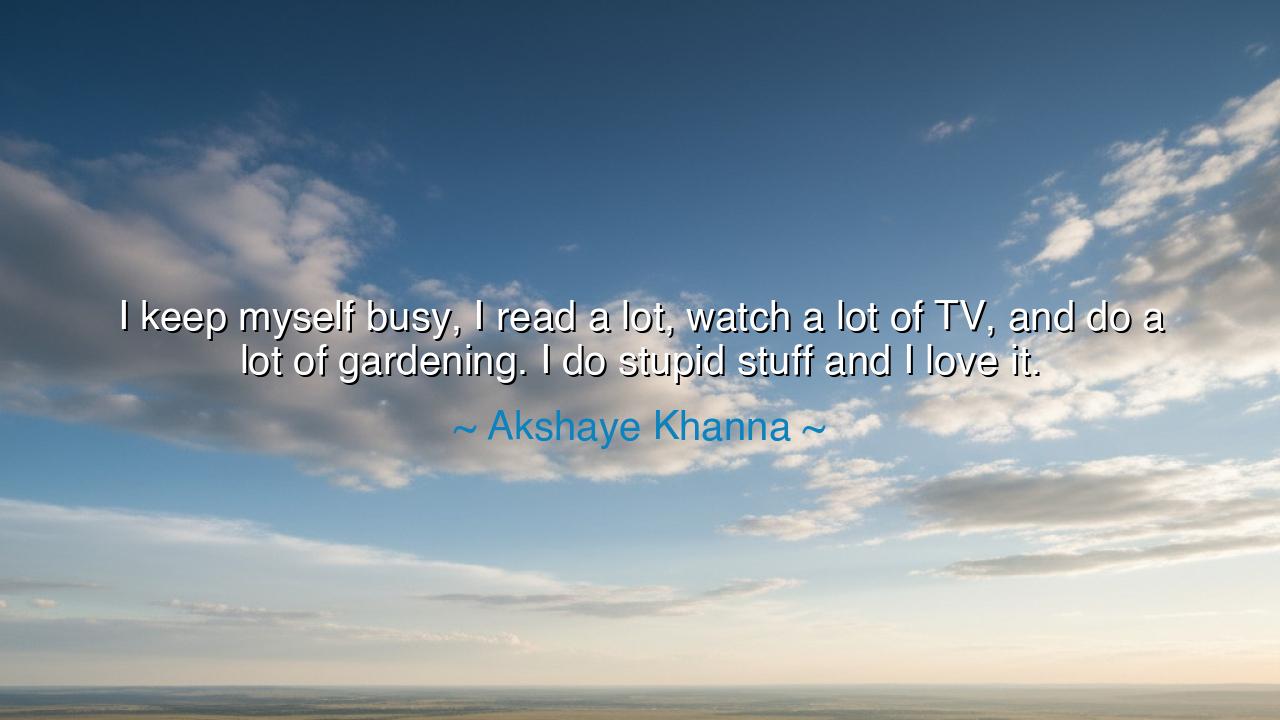
I keep myself busy, I read a lot, watch a lot of TV, and do a lot
I keep myself busy, I read a lot, watch a lot of TV, and do a lot of gardening. I do stupid stuff and I love it.






The words “I keep myself busy, I read a lot, watch a lot of TV, and do a lot of gardening. I do stupid stuff and I love it” were spoken by Akshaye Khanna, a reclusive artist known for his depth, restraint, and quiet refusal to chase the noise of fame. In this statement, hidden beneath its casual tone, lies a profound philosophy of simplicity, self-acceptance, and inner balance. It is the wisdom of one who has seen both the weight of the world’s expectations and the lightness of being free from them. Khanna speaks not as one withdrawn from life, but as one who has learned that peace comes not from grand achievement, but from finding joy in the humble rhythms of everyday existence.
When he says, “I keep myself busy,” it is not the frantic busyness of those fleeing from silence, but the mindful engagement of a soul that has made peace with solitude. The reading, the watching, the gardening — these are acts of quiet companionship with the self. Each, in its own way, becomes a small prayer, a dialogue with life that asks for nothing but presence. To read is to converse with minds across centuries; to garden is to commune with the earth; to watch the world through stories and art is to reflect on one’s own humanity. Through these small rituals, Khanna teaches what the ancients already knew — that a fulfilled life is not measured by glory, but by harmony.
Then he adds, almost with a smile, “I do stupid stuff and I love it.” In these words lies the freedom of the wise. For what the world calls “stupid” is often simply the unguarded joy of being human — the laughter that breaks the weight of perfection, the play that heals the wounds of discipline. In a world obsessed with productivity and purpose, Khanna reminds us that there is sacredness in playfulness, and wisdom in allowing oneself to be imperfect. Like the philosopher Diogenes, who once rolled his barrel down the street just to prove that not all seriousness is wisdom, Khanna celebrates the art of not taking oneself too seriously.
History, too, honors such souls. Albert Einstein, the great mind of science, often spoke of the power of curiosity and laughter. He played the violin, sailed without knowing how to swim, and found joy in small, seemingly meaningless things. When asked how he maintained his clarity, he said, “Play is the highest form of research.” In much the same way, Akshaye Khanna’s “stupid stuff” becomes the highest form of wisdom — a reminder that the soul must sometimes laugh, stumble, and create without reason in order to stay alive.
This quote also speaks to the balance between mind, body, and spirit. The reading nourishes the intellect; the gardening grounds the body; and the “stupid stuff” — the moments of silliness and spontaneity — nurtures the heart. Together, they form a complete life. It is the same balance that sages sought in their monasteries, poets in their solitude, and farmers in their fields. To live well, one must tend to all three — to think deeply, to labor gently, and to play freely. This is the rhythm of peace that Khanna describes, without pretense, without sermon, yet with the weight of truth.
There is also a quiet defiance in his tone — a rejection of the restless pursuit of success that consumes so many. In saying he loves his simple, even “stupid” activities, he reminds us that happiness does not need to be justified. The modern soul often feels guilty for resting, for laughing, for being ordinary. Yet Khanna’s words restore innocence to these acts. He echoes what the ancient mystics taught: that enlightenment is not escape from the mundane, but a deeper enjoyment of it. The divine is not always found in temples or triumphs, but in the humble moments where one is wholly present — pruning a leaf, reading a sentence, or laughing at nothing at all.
The lesson is profound in its simplicity: Do not chase greatness at the cost of joy. Keep yourself engaged with life’s small wonders. Let your days be filled with little rituals that bring calm, and let your spirit breathe through laughter and imperfection.
Practical actions: Read something each day that stirs your mind; spend time in nature, even if only tending to a single plant; allow yourself moments of unplanned silliness, for that is the soul’s way of stretching its wings. Do not fear being ordinary — fear only forgetting to live. For as Akshaye Khanna reminds us, a peaceful, playful heart is wiser than a restless, perfect one, and to love life in its simple forms is to live it fully.






AAdministratorAdministrator
Welcome, honored guests. Please leave a comment, we will respond soon